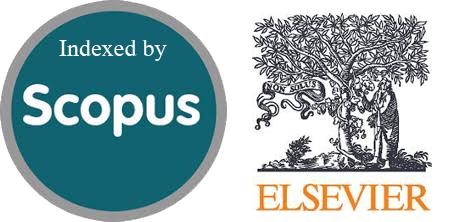Ex vivo and in vivo Assessment of Paliperidone Thermal in situ Gel as Nasal-to-Brain Delivery System in Rats
DOI:
https://doi.org/10.54133/ajms.v9i2.2460Keywords:
Bioavailability., Ex vivo, Nasal-to-brain delivery, Paliperidone, Thermal gelAbstract
Background: Paliperidone (PAL), an antipsychotic drug, has limited brain availability when administered orally due to poor blood–brain barrier penetration and systemic side effects. Intranasal delivery offers a promising strategy for direct brain targeting. Objective: To investigate the pharmacokinetics and brain-targeting efficiency of paliperidone-loaded nanosuspension thermo-responsive in situ gel for nose-to-brain delivery. Methods: The optimized NB-IG7 formulation was evaluated for ex vivo permeation using a Franz diffusion cell with sheep nasal mucosa, employing simulated nasal fluid. The cumulative drug permeation, steady-state flux (Jss), and permeability coefficient (P) were determined spectrophotometrically. In vivo pharmacokinetic and brain-targeting studies were done on male rats, where NB-IG7 gel was administered nasally vs. an IV dose. Over 48 hours, plasma and brain drug levels were measured for pharmacokinetic measurements. Results: The ex vivo tests showed that NB-IG7 had 3.3 times higher permeation across the nasal mucosa than PAL suspension, which confirmed that it had better mucosal penetration. Intranasal administration of NB-IG7 achieved significantly higher brain concentrations of PAL compared with IV administration. The brain Cmax and AUC0–48hr were 1.89µg/ml and 63.6 hr·µg/ml, respectively, representing 2.66- and 2.68-fold increases over IV administration (Cmax 0.71µg/ml, AUC0–48hr 23.7hr·µg/ml). Plasma exposure was lower after intranasal delivery (Cmax 0.19µg/ml, AUC0–48hr 4.66hr·µg/ml) compared with IV dosing (Cmax 0.87µg/ml, AUC0–48hr13.98hr·µg/ml). Brain-targeting assessments showed markedly enhanced values (DTE 807%, DTI 8%, and %DTP 91%), confirming efficient nose-to-brain transport via olfactory and/or trigeminal pathways. Conclusions: The new formula had superior enhanced brain targeting with reduced systemic exposure.
Downloads
References
Jaafer H, Al-Kinani KK. Formulation and evaluation of idebenone microemulsion as a potential approach for the transmucosal drug delivery systems. Iraqi J Pharm Sci. 2024;33(1):79-88. doi: 10.31351/vol33iss1pp79-88. DOI: https://doi.org/10.31351/vol33iss1pp79-88
Cassano R, Servidio C, Trombino S. Biomaterials for drugs nose–brain transport: a new therapeutic approach for neurological diseases. Materials. 2021;14(7):1802. doi: 10.3390/ma14071802. DOI: https://doi.org/10.3390/ma14071802
Jeong SH, Jang JH, Lee YB. Drug delivery to the brain via the nasal route of administration: exploration of key targets and major consideration factors. J Pharm Investig. 2023;53(1):119-152. doi: 10.1007/s40005-022-00589-5. DOI: https://doi.org/10.1007/s40005-022-00589-5
Shelar S, Mujawar NK, Chakorkar SS. In-vivo and ex-vivo methods: Advancing the frontiers of ocular pharmacological researches. Int J Pharm Sci Res. 2024;15(1):78-86. doi: 10.13040/IJPSR.0975-8232. DOI: https://doi.org/10.13040/IJPSR.0975-8232
Minwalla HD, Wrzesinski P. Paliperidone to treat psychotic disorders. Neurol Int. 2020;12(3). doi: 10.3390/neurolint13030035. DOI: https://doi.org/10.3390/neurolint13030035
Bhandari PR, (Ed.), Textbook of Pharmacology, (1st Edition), Thieme publisher, October 10, 2022.
Das P, Panda J, Panigrahi KC. Optimal mixture design enabled development of lyophilized nanoemulsifying drug delivery system of paliperidone. Drug Deliv Lett. 2024;14(2). doi: 10.2174/0122103031273803231221070539. DOI: https://doi.org/10.2174/0122103031273803231221070539
Kumbhar SA, Kokare CR, Shrivastava B, Gorain B, Choudhury H. Preparation, characterization, and optimization of asenapine maleate mucoadhesive nanoemulsion using Box-Behnken design: In vitro and in vivo studies for brain targeting. Int J Pharm. 2020;586:119499. doi: 10.1016/j.ijpharm.2020.119499. DOI: https://doi.org/10.1016/j.ijpharm.2020.119499
Rashid AM, Abdal-Hammid SN. Formulation and characterization of itraconazole as nanosuspension dosage form for enhancement of solubility. Iraqi J Pharm Sci. 2019;28(2):124–133. doi: 10.31351/vol28iss2pp124-133. DOI: https://doi.org/10.31351/vol28iss2pp124-133
Hussien RM, Ghareeb MM. Formulation and characterization of isradipine nano particle for dissolution enhancement. Iraqi J Pharm Sci. 2021;30(1):218-225. doi: 10.31351/vol30iss1pp218-225 DOI: https://doi.org/10.31351/vol30iss1pp218-225
Obayes KK, Thomas LM. Development and characterization of hyaluronic acid-incorporated thermosensitive nasal in situ gel of meclizine hydrochloride. Al-Rafidain J Med Sci. 2024;6(1):97-104. doi: 10.54133/ajms.v6i1.499. DOI: https://doi.org/10.54133/ajms.v6i1.499
Alkufi HK, Kassab HJ. Formulation and evaluation of sustained release sumatriptan mucoadhesive intranasal in-situ gel. Iraqi J Pharm Sci. 2019;28(2):95–104. doi: 10.31351/vol28iss2pp95-104. DOI: https://doi.org/10.31351/vol28iss2pp95-104
Salih OS, Al-Akkam EJ. Preparation, in-vitro, and ex-vivo evaluation of ondansetron loaded invasomes for transdermal delivery. Iraqi J Pharm Sci. 2023;32(3):71-84. doi: 10.31351/vol32iss3pp71-84. DOI: https://doi.org/10.31351/vol32iss3pp71-84
Abou Hussein DMN. Enhanced transdermal permeation of BCS class IV aprepitant using binary ethosome: Optimization, characterization and ex-vivo permeation. J Drug Deliv Sci Technol. 2021;61:102185. doi: 10.1016/j.jd.2020.102185. DOI: https://doi.org/10.1016/j.jddst.2020.102185
Reagan-Shaw S, Nihal M, Ahmad N. Dose translation from animal to human studies revisited. FASEB J. 2008;22(3):659-661. doi: 10.1096/fj.07-9574LSF. DOI: https://doi.org/10.1096/fj.07-9574LSF
Jabir SA, Rajab NA. Preparation, in-vitro, ex-vivo, and pharmacokinetic study of lasmiditan as intranasal nanoemulsion-based in situ gel. Pharm Nanotechnol. 2025;13(1):239-253. doi: 10.31351/vol33iss3pp128-141. DOI: https://doi.org/10.2174/0122117385285009231222072303
Wang F, Yang Z, Liu M, Tao Y, Li Z, Wu Z, et al. Facile nose-to-brain delivery of rotigotine-loaded polymer micelles thermosensitive hydrogels: In vitro characterization and in vivo behavior study. Int J Pharm. 2020;577:119046. doi: 10.1016/j.ijpharm.2020.119046. DOI: https://doi.org/10.1016/j.ijpharm.2020.119046
Nguyen TT, Maeng HJ. Pharmacokinetics and pharmacodynamics of intranasal solid lipid nanoparticles and nanostructured lipid carriers form nose-to brain delivery, Pharmaceutics. 2022;14(1). doi: 10.3390/pharmaceutics14030572. DOI: https://doi.org/10.3390/pharmaceutics14030572
Rudragangaiah S, Bhatta RG, Kotappa SB. Stability-indicating RP-HPLC method for the quantification of paliperidone in bulk and solid dosage form to establish validation and stability indicating parameters. Indian J Pharm Edu Res. 2019;3(5):166. doi: 10.5530/ijper.53.4s.166. DOI: https://doi.org/10.5530/ijper.53.4s.166
Pardeshi CV, Belgamwar VS, Surana SJ. Nanotechnology-mediated nose-to-brain drug delivery for neurodegenerative disorders. In: Rai M, Yadav A, (Eds), Nanobiotechnology in Neurodegenerative Diseases, Springer, Cham. doi: 10.1007/978-3-030-30930-5_6. DOI: https://doi.org/10.1007/978-3-030-30930-5_6
Tamer MA, Kassab HJ. The development of a brain targeted mucoadhesive amisulpride loaded nanostructured lipid carrier. Farmacia. 2023;71(5). doi: 10.31925/farmacia.2023.5.18. DOI: https://doi.org/10.31925/farmacia.2023.5.18
Gandhi S, Shastri DH, Shah J, Nair AB, Jacob S. Nasal delivery to the brain: harnessing nanoparticles for effective drug transport. Pharmaceutics. 2024;16(4):481. doi: 10.3390/pharmaceutics16040481. DOI: https://doi.org/10.3390/pharmaceutics16040481
Gu F, Ma W, Meng G, Wu C, Wang Y. Preparation and in vivo evaluation of a gel-based nasal delivery system for risperidone. Acta Pharm. 2016;66(4):555-562. doi: 10.1515/acph-2016-0047. DOI: https://doi.org/10.1515/acph-2016-0047
Alexander A, Agrawal M, Bhupal Chougule M, Saraf S, Saraf S. Nose-to-brain drug delivery: an alternative approach for effective brain drug targeting. In: Shegokar R, (Editor), Nano pharmaceuticals. Elsevier; 2020. p. 178. doi: 10.1016/B978-0-12-817778-5.00009-9. DOI: https://doi.org/10.1016/B978-0-12-817778-5.00009-9
Ezzat SM, Salem MA, El Mahdy NM, Ragab MF. Rivastigmine. In: Belwal T, Nabavi SM, Nabavi SF, Dehpour AR, Shirooie S, (Editors), Naturally occurring chemicals against Alzheimer's disease. Academic Press; 2021. p. 93-108. doi: 10.1080/10611860600721051. DOI: https://doi.org/10.1016/B978-0-12-819212-2.00007-4
Hamzah ML, Kassab HJ. Frovatriptan succinate intranasal delivery for brain targeting–in vivo study. Iraqi J Vet Med. 2023;47(2):101–109. doi: 10.30539/me2mm152. DOI: https://doi.org/10.30539/me2mm152
Alkufi HK, Kassab HJ. Nano spanlastic in situ gel for nose to brain delivery of nimodipine: In vitro optimization, and in vivo pharmacokinetic study. Al-Rafidain J Med Sci. 2025;8(1):97-105. doi: 10.54133/ajms.v8i1.1687. DOI: https://doi.org/10.54133/ajms.v8i1.1687

Downloads
Published
How to Cite
Issue
Section
License
Copyright (c) 2025 Al-Rafidain Journal of Medical Sciences ( ISSN 2789-3219 )

This work is licensed under a Creative Commons Attribution-NonCommercial-ShareAlike 4.0 International License.
Published by Al-Rafidain University College. This is an open access journal issued under the CC BY-NC-SA 4.0 license (https://creativecommons.org/licenses/by-nc-sa/4.0/).











